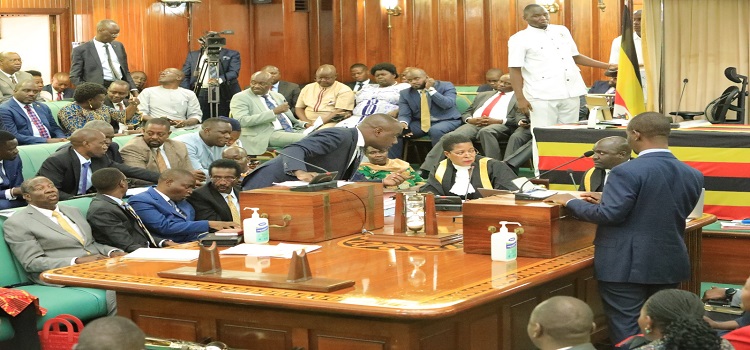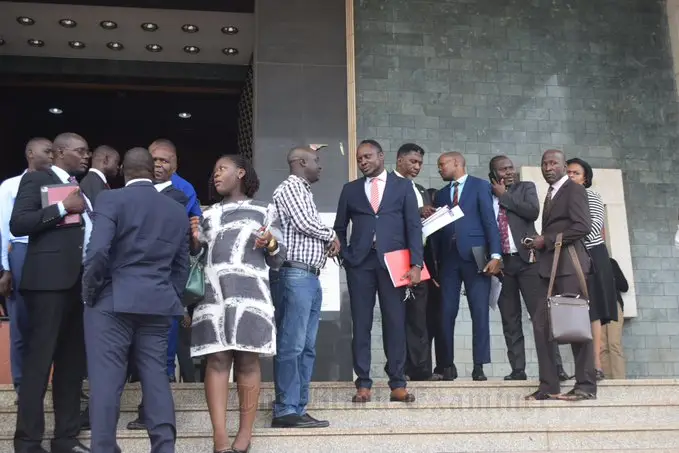It seems like Uganda’s national budget has had a wild year, one that should be featured in a telenovela, complete with plot twists, unexpected penalties, and bonds being switched around like Matooke in a village market. In a shocking discovery, a report from the Public Accounts Committee has exposed serious financial mismanagement during the 2022/23 fiscal year. The kind of mismanagement that would make even the most careless boda boda rider cringe.
The Committee, chaired by Muwanga Kivumbi (Butambala County), delivered a detailed report to Parliament that focused on government spending, particularly the role of Bank of Uganda (BoU) in bond transactions. Apparently, bonds worth a jaw dropping 1.2 trillion shillings were switched by BoU on behalf of the government during the last financial year. However, in a plot twist worthy of a village rumor mill, the government somehow forgot to pay off the original bond when it matured, preferring instead to roll it over into another bond. This bond swap game resulted in an accumulation of 180 billion shillings in interest payments—yes, 180 billion, not just pocket change.
It’s like borrowing a sack of maize flour, promising to pay it back next week, but then returning with another sack of flour that’s half the size, yet somehow owing double. Kivumbi told Parliament that if the government had just paid the debt when it was due, this interest would have been avoided. One can only wonder where the appropriated funds disappeared to—perhaps to the same place where last year’s promises of road repairs went?
The discoveries kept coming. BoU, the country’s own central bank, turned around and penalized the government Shs 405 billion for failing to meet its domestic debt obligations. That’s right, the government fined itself. It’s like borrowing money from your neighbor, and when you don’t pay them back, they charge you for not paying them on time. And don’t forget the Shs 16.6 billion in bank charges, even though BoU technically works for the government.
As though the story couldn’t get more bizarre, Kivumbi revealed that the Ministry of Finance’s Permanent Secretary, Ramathan Ggoobi, is currently negotiating with BoU to reduce these penalty fees. You know, just like how you negotiate with your local shopkeeper for that extra kilogram of sugar when you’re short on cash.
It doesn’t end there. If you thought commitment fees were only for securing your dowry payments, think again. The government ended up paying Shs 112 billion in commitment fees for undisbursed loans, even though only Shs 48.6 billion had been allocated by Parliament for this purpose. Most of these payments were due to incomplete project designs or a lack of counterpart funding. Essentially, the government is paying huge amounts for loans it hasn’t even used yet—imagine paying for a wedding that hasn’t been scheduled because you haven’t found the bride yet.
Kivumbi pointed out that the penalties in these situations should be more severe for the Accounting Officers who request loans without having all their ducks in a row. It’s like trying to cook Luwombo without first getting the banana leaves—how do you even begin?
And if that wasn’t enough to make you shake your head in disbelief, let’s talk about the Karuma Dam project. The government entered into an interest rate swap agreement with Stanbic Bank and Standard Chartered Bank to manage the foreign exchange risks of a loan for the dam’s construction. The idea was to keep things stable, but instead, the government has so far paid $36.4 million to secure a return of just $2.5 million. Even in a poker game, those are bad odds. The Committee recommended that government staff get proper training on these complex financial instruments before the entire treasury goes down the river, literally.
Finally, the Uganda Revenue Authority (URA) decided to reward itself for hitting its 2021-2022 revenue targets with a Shs 11.6 billion bonus. However, the problem here is that Parliament didn’t actually approve the payments. It’s like inviting yourself to someone’s Kwanjula (introduction ceremony), taking a gift, and expecting everyone to be okay with it. The Minister of Finance had allowed URA to retain the funds, but Parliament was not consulted, making the bonus payments as irregular as a misplaced tax declaration.
With Parliament Speaker Anita Among postponing the debate and giving the Minister of Finance two weeks to explain these financial irregularities, Ugandans will have to wait and see if the government can account for the billions that seem to be vanishing faster than rainwater during the Karamoja dry season.
Table of Major Financial Concerns Exposed by the Committee:
| Issue | Amount (UGX) | Explanation |
|---|---|---|
| Interest on bond switches | 180 billion | Accrued interest due to unpaid matured bonds |
| Penalty by BoU for unmet obligations | 405 billion | Government penalized by its own central bank |
| Bank charges | 16.6 billion | Additional charges despite BoU being a government entity |
| Commitment fees for undisbursed loans | 112 billion | Fees paid on loans not yet utilized due to project delays and lack of funds |
| URA staff bonus | 11.6 billion | Bonus paid without Parliamentary approval |




















